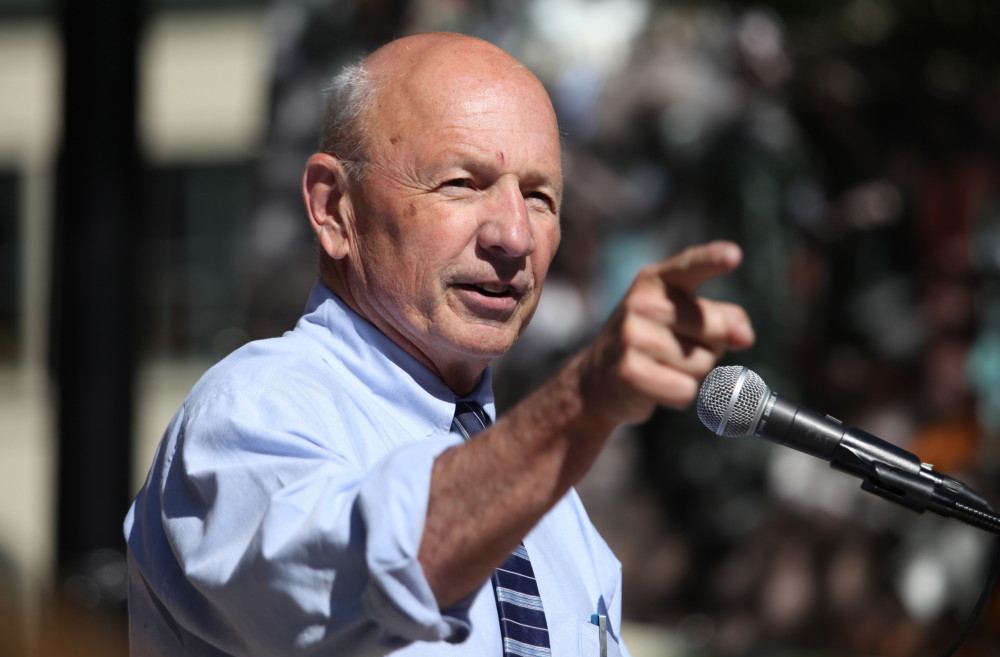The Portland City Council’s Finance Committee listened to more than two hours of testimony Thursday on a measure that would raise the city’s minimum wage to a level above the state minimum, but postponed making a final recommendation until next year.
Councilor Nicholas Mavodones Jr., the committee chairman, said his panel may not consider the proposal to increase the minimum wage from $7.50 to $9.50 until January or February. The Finance Committee can only make a recommendation to the full City Council, but its recommendations are often adopted.
The four city councilors on the Finance Committee agreed that the proposal being advanced by Mayor Michael Brennan needs more work, including an economic impact study, before it can be voted on.
Mavodones and fellow committee members Jill Duson, Jon Hinck and Edward Suslovic gave no indication of whether they will support the measure, which suggests an appropriation of $50,000 be set aside to pay for someone to enforce the new minimum wage law and at least another $50,000 to pay for legal challenges that may arise.
“I think there is a very solid legal argument to be made at this point for adopting a higher minimum wage in Portland,” Brennan said.
City Attorney Danielle West-Chuhta previously has said the city has the legal authority to create its own minimum wage that is higher than the state and federal minimums of $7.50 and $7.25 an hour, respectively, under the home-rule clause in the Maine Constitution.
However, West-Chuhta has said she cannot dismiss the possibility that the measure might be challenged in court. Gov. Paul LePage opposes an increase in the state’s minimum wage, and said in October during a gubernatorial debate in Portland that a citywide minimum wage would be unconstitutional.
Public opinion on the proposal was sharply divided at Thursday evening’s hearing, with service-centered industries such as restaurants and hotels predicting that a wage increase might drive businesses out of Portland.
Many others said the increase proposed by the mayor doesn’t even come close to providing individuals and families with a living wage.
Jeremiah Baker said he works between 36 hours and 46 hours a week for Youth Building Alternatives. Although the 17-year-old Portland resident earns more than the minimum wage, it’s not enough to rent an apartment.
“The minimum wage just doesn’t cut it,” Baker said.
In the proposed ordinance, it says that the fair market rent in Portland for a two-bedroom apartment is $1,012 a month. In order to afford such a rent, a full-time worker would have to earn at least $19.46 an hour, according to the ordinance.
The Portland Regional Chamber of Commerce is opposed to the city setting itself apart from the rest of Maine by adopting its own minimum wage. A chamber official said Portland should let its legislative and congressional leaders debate the issue.
“The chamber welcomes this debate about prosperity being brought forward by the mayor,” said spokesman Chris O’Neil. “But it shouldn’t be happening at the city level. It’s a state and federal issue.”
State Sen. Justin Alfond of Portland, part owner of Bayside Bowl on Alder Street, said he decided when he opened the restaurant and bowling alley four years ago to pay his employees an hourly wage that is higher than the state minimum. More than half of the employees he hired are still working at Bayside Bowl, and he said his business is profitable.
“Too many workers are struggling to get by on the minimum wage. The working poor do not have many people fighting for them and they are looking to their elected leaders for help,” Alfond said. “Raising the minimum wage is morally the right thing to do.”
Brennan said it’s unlikely that the City Council would be able to implement the wage increase by July 1, 2015, the date recommended in the proposed ordinance. A more likely implementation date would be Jan. 1, 2016, Brennan told the committee.
The ordinance calls for the minimum wage to increase from $9.50 an hour in the first year to $10.10 an hour in the second year and to $10.68 in the third year. After Jan. 1, 2017, the wage would increase annually through cost-of-living adjustments tied to the Consumer Price Index.
Portland’s proposed ordinance states that “after years of inaction by the United States Congress, it is time for municipalities and states to lift families out of poverty and stimulate the economy by raising the minimum wage. … The cost of living in Portland has increased, making life here cost, as a percentage of income, as much as is paid by the residents of Chicago and Sacramento and other major United States cities.”
Send questions/comments to the editors.




Success. Please wait for the page to reload. If the page does not reload within 5 seconds, please refresh the page.
Enter your email and password to access comments.
Hi, to comment on stories you must . This profile is in addition to your subscription and website login.
Already have a commenting profile? .
Invalid username/password.
Please check your email to confirm and complete your registration.
Only subscribers are eligible to post comments. Please subscribe or login first for digital access. Here’s why.
Use the form below to reset your password. When you've submitted your account email, we will send an email with a reset code.